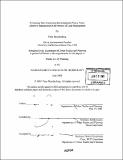Evaluating next-generation environmental policy tools : adaptive management in the Bureau of Land Management
Author(s)
Brandenburg, Peter (Peter J.)
DownloadFull printable version (5.627Mb)
Other Contributors
Massachusetts Institute of Technology. Dept. of Urban Studies and Planning.
Advisor
Judith Layzer.
Terms of use
Metadata
Show full item recordAbstract
The U.S. Bureau of Land Management (BLM) has begun to embrace the concept adaptive management as an alternative to traditional natural resource planning and management models. Adaptive management may provide BLM managers with a means to evaluate the effectiveness of management actions, the flexibility to adjust actions that have not proved effective, opportunities for rapid learning relevant to improved management, and improved public support for resource management decisions. To realize these benefits, BLM must include two critical elements in its adaptive management strategies: 1) adaptive design of management objectives, actions, monitoring and evaluation protocols and 2) effective collaboration among BLM and interested stakeholders. I evaluate three case studies of BLM adaptive management and find that none of the cases have fully included the critical elements. While there are some encouraging signs, the cases collectively reveal several key shortcomings. The strategies have not capitalized on the potential to improve management through learning. Two cases illustrate the risk that adaptive management may be misapplied to remove requirements for predictive impact analysis and mitigation, putting resources at risk. The cases have not featured a joint fact finding collaborative structure to provide stakeholders with early and integrated roles in the adaptive management process. I also identify a number of institutional barriers that have prevented BLM from consistently including the critical elements. (Cont.) If BLM cannot remove these barriers by providing agency-wide policy and guidance for adaptive management, capacity building for local staff and stakeholders and adequately funded, binding implementation commitments, the agency will not realize the 'benefits it seeks and adaptive management will not represent a significant improvement to BLM's practice of natural resource management.
Description
Thesis (M.C.P.)--Massachusetts Institute of Technology, Dept. of Urban Studies and Planning, 2005. Includes bibliographical references (p. 89-93).
Date issued
2005Department
Massachusetts Institute of Technology. Department of Urban Studies and PlanningPublisher
Massachusetts Institute of Technology
Keywords
Urban Studies and Planning.